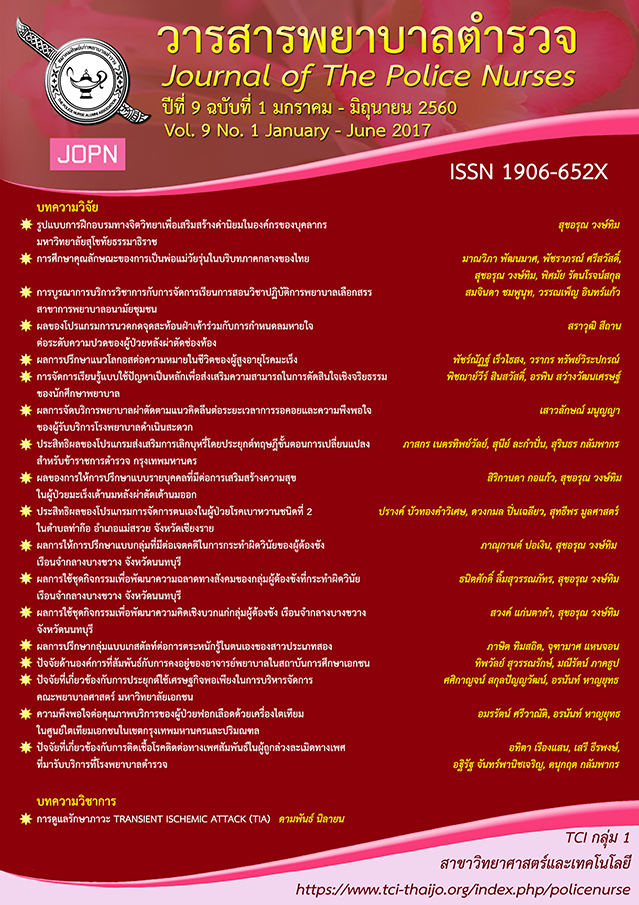ประสิทธิผลของโปรแกรมส่งเสริมการเลิกบุหรี่โดยประยุกต์ทฤษฎีขั้นตอนการเปลี่ยนแปลงสำหรับข้าราชการตำรวจ กรุงเทพมหานคร
คำสำคัญ:
พฤติกรรมการเลิกสูบบุหรี่, ขั้นตอนการเปลี่ยนแปลงพฤติกรรม, ข้าราชการตำรวจ กรุงเทพมหานคร, smoking cessation, stage of change, metropolitan policeบทคัดย่อ
การสูบบุหรี่ของข้าราชการตำรวจเป็นสาเหตุสำคัญที่ส่งผลกระทบต่อสุขภาพ อีกทั้งข้าราชการตำรวจเป็นผู้บังคับใช้กฎหมายให้เป็นไปตามมาตรการการบริโภคยาสูบ การส่งเสริมการเลิกบุหรี่จึงเป็นสิ่งสำคัญ การวิจัยนี้เป็นการวิจัยกึ่งทดลอง เพื่อศึกษาประสิทธิผลของโปรแกรมส่งเสริมการเลิกบุหรี่สำหรับข้าราชการตำรวจกรุงเทพมหานคร กลุ่มตัวอย่าง คือ ข้าราชการตำรวจ ที่อยู่ในระดับการเปลี่ยนแปลงพฤติกรรมขั้นลังเลใจแบ่งเป็นกลุ่มทดลอง 30 คน กลุ่มเปรียบเทียบ 30 คน โดยกลุ่มทดลองได้รับโปรแกรมส่งเสริมพฤติกรรมช่วยเลิกสูบบุหรี่ ใช้เวลา 10 สัปดาห์ โดยจัดกิจกรรม สัปดาห์ละ 1 ครั้ง เป็นเวลา 4 สัปดาห์ และติดตามผลภายหลังการทดลองในสัปดาห์ที่ 6 และ สัปดาห์ที่ 10 ส่วนกลุ่มเปรียบเทียบได้รับกิจกรรมช่วยเลิกบุหรี่ 1 ครั้ง ใช้เวลา 1 ชั่วโมง 30 นาที เก็บรวบรวมข้อมูลด้วยการให้ตอบแบบสอบถามด้วยตนเอง ก่อนการทดลอง หลังการทดลอง และระยะติดตามผล โดยวิเคราะห์ข้อมูลเปรียบเทียบความแตกต่างของคะแนนเฉลี่ยด้วยสถิติ Two way repeated measures ANOVA เปรียบเทียบความแตกต่างรายคู่ ด้วยสถิติ Bonferroni เปรียบเทียบความแตกต่างของคะแนนเฉลี่ยระหว่างกลุ่มด้วย Independent t-test และเปรียบเทียบค่าสัดส่วนของผู้ที่สามารถเลิกสูบบุหรี่ได้ ด้วยสถิติ Chi-square
ผลการศึกษาพบว่า ภายหลังการทดลองและระยะติดตามผล กลุ่มทดลองมีระดับขั้นของการเปลี่ยนแปลงพฤติกรรมดีกว่ากลุ่มเปรียบเทียบ และมีคะแนนเฉลี่ยในด้านความสมดุลของการตัดสินใจในการเลิกสูบบุหรี่ การรับรู้ความสามารถของตนเองในการเลิกสูบบุหรี่ และพฤติกรรมการเลิกสูบบุหรี่หลังการทดลองและในระยะติดตามมากกว่าก่อนการทดลองและมากกว่ากลุ่มเปรียบเทียบอย่างมีนัยสำคัญทางสถิติ (p < .05) นอกจากนี้ยังพบว่าจำนวนผู้ที่เลิกสูบบุหรี่ได้ระหว่างกลุ่มทดลองและกลุ่มเปรียบเทียบภายหลังการทดลองและติดตามผล มีความแตกต่างกันอย่างมีนัยสำคัญทางสถิติ (p < .05)
ผลการวิจัยครั้งนี้ เสนอแนะว่าโปรแกรมส่งเสริมการเลิกบุหรี่ที่เหมาะสมและสอดคล้องกับระดับการเปลี่ยนแปลงพฤติกรรมของบุคคลสามารถนำมาใช้ส่งเสริมให้ผู้ที่สูบบุหรี่มีกระบวนการคิด เกิดความมั่นใจที่จะเลิกสูบบุหรี่และทำพฤติกรรมอย่างต่อเนื่อง ส่งผลให้เกิดการเลิกสูบบุหรี่ได้
THE EFFECTIVENESS OF A SMOKING CESSATION PROGRAM APPLICATION THE STAGE OF CHANGE THEORY FOR METROPOLITAN POLICE
Abstract
Smoking of police beside effected their health and it involved the role of law enforcement in accordance with the measures of tobacco consumption. Promoting smoking cessation in the police is important. This quasi-experimental research with two group pretest-posttest design to study the effectiveness of a smoking cessation program applying the transtheoretical model of behavior change for the metropolitan police. Samples were metropolitan police smokers at the contemplation stage, which randomly selected into the experimental group and the comparison group of 30 samples for each. The experimental group received the smoking cessation program applying the transtheoretical model of behavior change in 10 weeks and received the smoking cessation program once a week, for 4 weeks. The comparison group received one time activity for 1 hour 30 minute for advice on smoking cessations and self-help material for smoking cessation. Data were collected by self administered questionnaires at before the experiment, 6th week and 10th week after the experiment. Data were analyzed with statistical program with additional statistical methods: differences in mean scores, decision balance to smoking cessation, perceived self-efficacy to smoking cessation and smoking cessation behavior, before the experimentation and after the experimentation in were compared using by two way repeated measures ANOVA and after the experimentation between experimental and control groups were compared using by Bonferroni correlation and proportion of smoking cessation, before the experimentation and after the experimentation between experimental and control groups were compared using by Chi-square.
The results revealed that after experiment and follow up the experimental group had stage of behavior change better than the comparison group. And they had mean scores of decision balance for smoking cessation, perceived self-efficacy in smoking cessation and smoking cessation behaviour higher than the comparison group (p < .05). Beside, there was a statistically significant differences reguard to the number of smokers who quit between the experimental group and the comparison group (p < .05).
This finding that the smoking cessation program applying the transtheoretical model of behavior change can enhance smokers to step up and change their smoking behaviour and quit smoking.
Downloads
ดาวน์โหลด
เผยแพร่แล้ว
รูปแบบการอ้างอิง
ฉบับ
ประเภทบทความ
สัญญาอนุญาต
ผลงานที่ได้ตีพิมพ์แล้วจะเป็นลิขสิทธิ์ของวารสารพยาบาลตำรวจ















